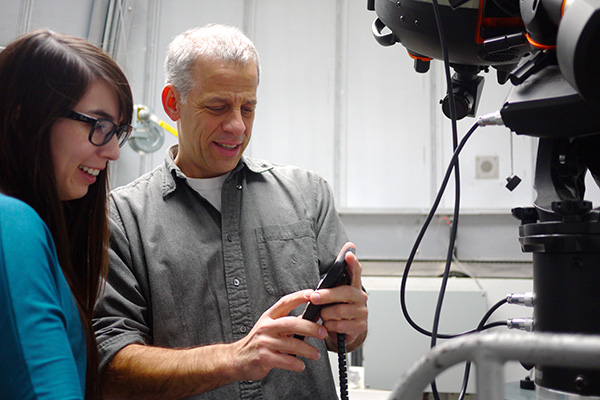Science outreach, through the stars
May 11, 2016
Share
When Nathalie Ouellette (PhD’16) was searching for a graduate school more than six years ago, she knew that the opportunity to work in science outreach would be a key factor in her decision.
As a young girl, she’d had many mentors, particularly during her time at summer camps and on her high school robotics team, from a teacher. These people sparked her imagination and drove her to pursue science. As she’s moved through her studies in astrophysics, her desire to give that same mentorship and role-modelling – especially to young girls – has become stronger.

“The opportunity to work in the Queen’s Observatory was a really important factor in my decision to come to Queen’s,” says Ms. Ouellette, who steps down this month as observatory coordinator after almost six years in the role. “I love the reactions of the kids when they come to the open houses. They are so excited and they know so much, asking really varied, high-calibre questions. They’ve done a lot of research.”
Ms. Ouellette says that the girls who come to the open houses seem to like seeing a woman in the observatory role. “It gives them the feeling that they can do it, too.”
While she was an undergraduate at McGill, Ms. Ouellette met Queen’s Professor Stéphane Courteau (Physics, Engineering Physics and Astronomy) at the Canadian Undergraduate Physics Conference. He told her about the observatory position, which he oversees, as well as other experiential learning opportunities at Queen’s (such as site visits to observatories in Hawaii and Chile). The potential position was what eventually sealed her choice – she completed her master’s with Dr. Courteau and stayed on for her PhD, which she plans to defend this year.
A career in science communication
Ms. Ouellette’s goal is to pursue a career in science communication after graduation.
“I’d like to work at a museum or an observatory – I want to be the link between the research and the public,” she says. “I think it’s really important to have people with strong backgrounds in science to have these communication roles, because there is so much misinformation out there.”
The observatory, located in Ellis Hall, has been the perfect place for Ms. Ouellette to hone the skills needed for public outreach work, and to experiment with different programming and activities, to see what best suits the audience.
"There is a lot of diplomacy required for this position, and it's of a different nature than what you see in academia. Between scientists, we tend to just lay it all out there because facts are facts are facts, and the numbers don't lie. In education and outreach, there's a lot more nuance," she says. "In this role, I've learned how to talk to a diversity of people in many different ways."
The Queen’s Observatory runs public open houses on a monthly basis. At each event, a professor or graduate student from Queen’s or the Royal Military College is invited to give a talk on various aspects of astronomy. Afterwards, audience members have the opportunity to go up into the dome on the Ellis Hall roof to look at the night sky through the 14-inch telescope. The observatory also accommodates school groups at pre-arranged times.
“The majority of people who come through feel the romantic connection – they feel the connection with distant planets, the light particles of Jupiter hitting them, for example. They are mesmerized by it,” says Ms. Ouellette. “We don’t have the connection with nature that many of our ancestors did. And even though our observatory is not in the most ideal location, being in the city, looking through the telescope up in Ellis Hall broadens people’s minds. They enjoy it.”
Open houses popular with the public
Ms. Ouellette’s biggest challenge running the observatory happens to also be a source of great pride. Attendance at the open houses has risen steadily over the past few years – and there have been times when more than 150 people have lined up to hear the talk and take a turn at the telescope.
“It’s so great that so many people want to come, but the challenge is how to accommodate that many visitors. It’s been a challenge for me, and it will be the challenge for the incoming coordinator.”
The new observatory coordinator, Matthew Chequers, a PhD student in astrophysics with Professor Larry Widrow, says he wants to continue a system Ms. Ouellette began, whereby attendees are separated into groups and each group takes a turn in the observatory. While waiting, Mr. Chequers and volunteers would provide supplementary activities on the building’s ground floor.
“We are definitely working on a plan to make things run smoothly at each open house,” says Mr. Chequers, who, like Ms. Ouellette, really enjoys talking with young children and teens about astrophysics.
“If I can, in some way, instill or help younger people realize their passion for astronomy, or their passion for anything, and steer their career goals in the direction of something they love to do, then I consider my goal to be achieved,” he says.
The next open house at Queen’s Observatory is Saturday, May 14, 9-10:30 pm.
Read more about Ms. Ouellette’s research in the Alumni Review.